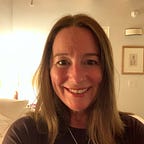A Teacher’s Spiritual Crisis
The paradox of my life as a teacher is that I feel this work is killing me, yet I also love this work obsessively, with a kind of madness. I dream about teaching, and in my dreams I am sometimes a better teacher than I am in real life.
The paradox, too, is that I have never been better at teaching as I am now, yet my devotion to the work imperils my future in it. I am so thoroughly exhausted and heartbroken: at the system and its nonsense talk of standards and assessment, and at the society that has addicted our students to devices and then abandoned them.
Teaching did not start out for me as a spiritual practice, but it has become one, and now, this is the only reason I teach. I teach in order to help students discover their truest selves and to bring those selves more fully into the world. We practice this through reading, deep contemplation, discussion, and the creative act of putting ideas into writing. This work requires openness and courage, and my students have both. They want to know their minds more deeply. They are willing to listen to others’ perspectives. They desperately crave an educational experience that sees them as whole humans.
And yet the education system is at its core dehumanizing. As teachers we’re asked to evaluate large numbers of students as if they were cattle; it’s seen as a weakness if we get too involved or allow emotions to interfere with our “assessments.” As students we’re asked to complete a plethora of disconnected tasks, some of which exist only to fulfill a bureaucratic notion of what learning is. The system actually treats rubrics as if they constitute feedback, and it has to, because what teacher has time to engage with each of their students in true conversation?
There are countless resources on “formative assessments,” countless technological tools, countless webinars and highly priced professional development workshops, but no one is answering the essential questions: What are we doing all of this for? Why is education important, in a world where everything can be Googled? What kind of people do we want to be? And what kind of world are we preparing our students for?
Another paradox muddies the waters: Education is supposed to make us more capable, but can an educated person truly cope with the world we are living in, a world of violence, untruth, cowardice, and distraction? Part of me wonders if we really want to educate our students, or whether we prefer just to go through the motions, never really pulling back the veil. We transmit “content” to our students, test them on it, and then pretend that it all means something important.
And yet the presence of divine love shows up every day in my classroom, invited in by our opening meditation. I can feel how things shift in the room when we are quiet. I sometimes feel that the only good thing I do as a teacher is to preserve those brief moments of quiet, where we can hear our own truth guiding us, if we listen.
